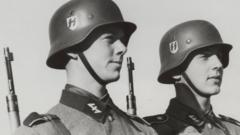Charlotte "Betty" Webb played a pivotal role in intelligence during WWII, helping to decipher Axis communications that proved critical to the Allied war effort.
**Legacy of a Codebreaker: Charlotte Webb Remembered at 101**

**Legacy of a Codebreaker: Charlotte Webb Remembered at 101**
Charlotte Webb, a key figure in the WWII code-breaking efforts at Bletchley Park, passes away after a life dedicated to service.
Charlotte Webb, known affectionately as Betty, has passed away at the age of 101, leaving behind a legacy marked by her significant contributions to Britain's wartime intelligence efforts. Webb was a prominent member of the code-breaking team at Bletchley Park, the secretive British facility responsible for deciphering encrypted enemy communications during World War II. Her death on Monday was confirmed by both the Women’s Royal Army Corps Association and the Bletchley Park Trust.
Joining the Auxiliary Territorial Service at just 18 years old, Webb began her role at Bletchley Park in 1941. During her tenure, until the end of the war in 1945, she contributed to the successful decryption of German and Japanese signals. Webb and her colleagues worked tirelessly, utilizing mathematics and cryptography to crack codes that would provide vital intelligence to Allied forces.
In recognition of her service, Webb was appointed as a Member of the Order of the British Empire in 2015 and was later awarded France's prestigious Légion d’Honneur in 2021. As one of the few remaining women from the original Bletchley Park team, her experiences were a testament to the vital roles women played in wartime efforts.
Before enlisting, Webb had been pursuing domestic sciences at a local college, but shifted her focus to public service as the war intensified. Reflecting on her decision, she stated during an oral history interview in 2012, "Several of us decided that we ought to be serving our country rather than just making sausage rolls." Her contributions helped shift the tide of the war by enabling Allied ships to maneuver safely, avoiding peril from German submarines.
Charlotte Webb's life and legacy serve as a reminder of the unsung heroes of history and the critical roles played by women in wartime, whose stories continue to inspire future generations.
Joining the Auxiliary Territorial Service at just 18 years old, Webb began her role at Bletchley Park in 1941. During her tenure, until the end of the war in 1945, she contributed to the successful decryption of German and Japanese signals. Webb and her colleagues worked tirelessly, utilizing mathematics and cryptography to crack codes that would provide vital intelligence to Allied forces.
In recognition of her service, Webb was appointed as a Member of the Order of the British Empire in 2015 and was later awarded France's prestigious Légion d’Honneur in 2021. As one of the few remaining women from the original Bletchley Park team, her experiences were a testament to the vital roles women played in wartime efforts.
Before enlisting, Webb had been pursuing domestic sciences at a local college, but shifted her focus to public service as the war intensified. Reflecting on her decision, she stated during an oral history interview in 2012, "Several of us decided that we ought to be serving our country rather than just making sausage rolls." Her contributions helped shift the tide of the war by enabling Allied ships to maneuver safely, avoiding peril from German submarines.
Charlotte Webb's life and legacy serve as a reminder of the unsung heroes of history and the critical roles played by women in wartime, whose stories continue to inspire future generations.
















